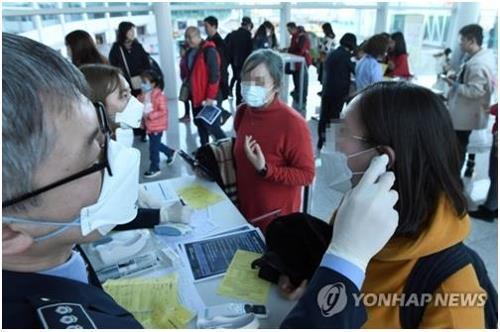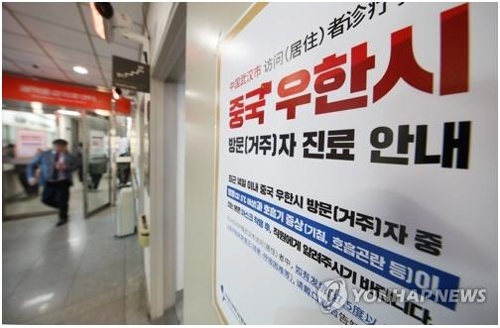- California Assembly OKs highest minimum wage in nation
- S. Korea unveils first graphic cigarette warnings
- US joins with South Korea, Japan in bid to deter North Korea
- LPGA golfer Chun In-gee finally back in action
- S. Korea won’t be top seed in final World Cup qualification round
- US men’s soccer misses 2nd straight Olympics
- US back on track in qualifying with 4-0 win over Guatemala
- High-intensity workout injuries spawn cottage industry
- CDC expands range of Zika mosquitoes into parts of Northeast
- Who knew? ‘The Walking Dead’ is helping families connect
S. Korea going all-out to prevent spread of Wuhan coronavirus during holidays
South Korea’s public health authorities on Thursday remained on alert and said that every effort will be made to prevent the spread of the Wuhan coronavirus during the upcoming four-day Lunar New Year holiday, with the country’s citizens advised not to visit the central Chinese city at the epicenter of the disease.
The country reported its first confirmed case of the new coronavirus on Monday when a Chinese resident who arrived at Incheon International Airport, the country’s main gateway, on Sunday tested positive for the virus.


A quarantine official (L) checks a traveler for fever and other symptoms at South Korea’s Incheon International Airport, west of Seoul, on Jan. 20, 2020. (Yonhap)
Airports across the nation have been ratcheting up their monitoring and checking of passengers from China and other countries for signs of illness, with local authorities accelerating quarantine efforts to contain the virus during the busy Lunar New Year travel season.
Citizens should follow strict personal hygiene rules whether they are in the country or traveling abroad, especially since there is expected to be an influx of Chinese tourists coming to the South Korea during the holiday period, according to the Korea Centers for Disease Control and Prevention (KCDC). The agency said people feeling ill should immediately contact its emergency call center by dialing “1339″ to receive assistance.
The Ministry of the Interior and Safety too issued a text message alert calling on citizens to wash their hands frequently, cover their mouths when coughing and if they have respiratory problems wear a mask.
Common symptoms of the coronavirus, thought to have originated in Wuhan, central China, include fever, sore throat and breathing difficulties.
Lunar New Year is celebrated by both Korean and Chinese people. The traditional holiday, which kicks off Friday, will see increased movement within the country and abroad, potentially exposing more people to the virus, the center said.
China said Thursday that the virus had killed 17 so far, with over 570 citizens confirmed to be infected, amid concerns that the pneumonia-like illness is spreading quickly and widely.
Beijing pledged on Wednesday to pool all of its resources to contain the further spread of the disease, especially since many people have time off till the end of the month so they can visit family and friends.
Japan, Taiwan, Thailand and the United States have also reported confirmed cases of the disease.
The foreign ministry applied the alert level of “restraint” to Wuhan, the third highest in the four-tier travel warning system, while issuing the lowest alert level of “caution” for other areas in China’s Hubei Province.
The ministry also urged South Korean citizens currently in Wuhan to take extra care to ensure their health and safety.
Korean Air Lines Co., South Korea’s national flag carrier, said Thursday it will suspend its flights to Wuhan by the end of this month.
The move comes after the Chinese authorities made a decision to not allow most inbound and outbound flights on domestic and international routes at the airport there starting Friday.
Korean Air currently operates four flights a week from Incheon International Airport to Wuhan Tianhe International Airport.
The KCDC the day before said that four suspected cases have tested negative for the Wuhan coronavirus and that none of the 21 people who showed symptoms so far reported in the country have been linked to the virus.
The new coronavirus, first reported in China late last year, was originally believed to be passed to humans from animals but is now known to be transmissible person to person, although victims may be contracting the virus by coming in contact with saliva and other bodily fluids rather than through airborne factors.
The KCDC said local health experts will be sent to China so they can better look after South Korean citizens living there.








![일본 사도광산 [서경덕 교수 제공. 재판매 및 DB 금지]](http://www.koreatimesus.com/wp-content/uploads/2024/07/PYH2024072610800050400_P4-copy-120x134.jpg)


